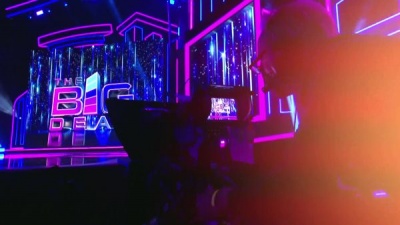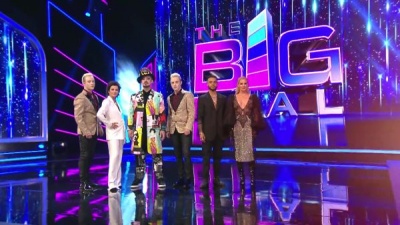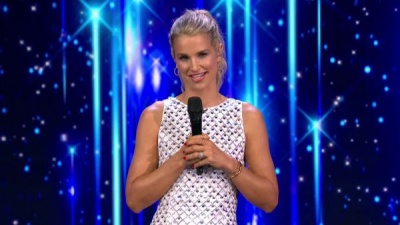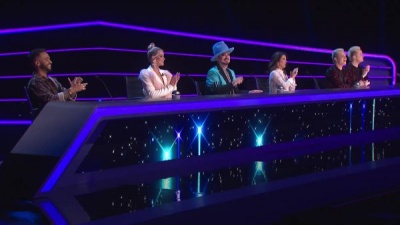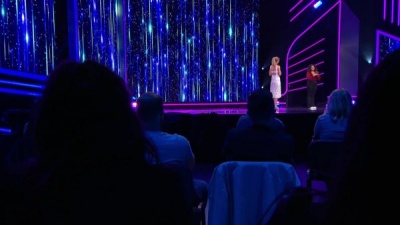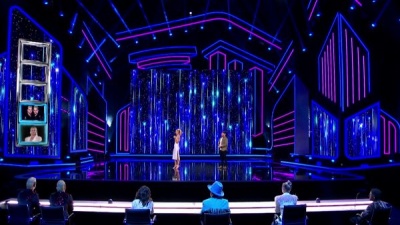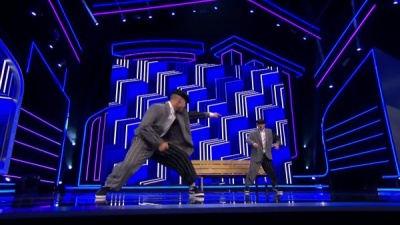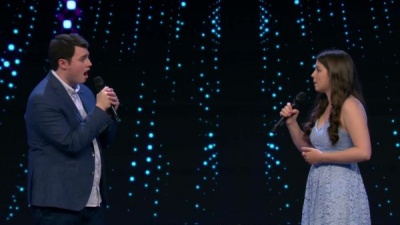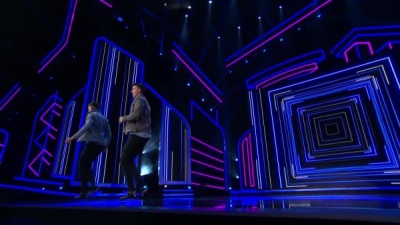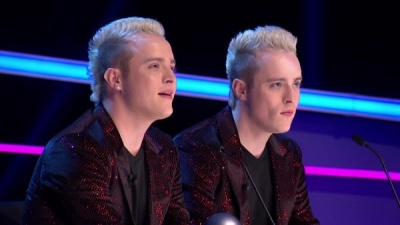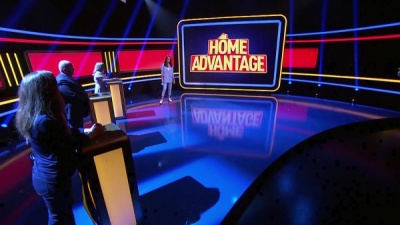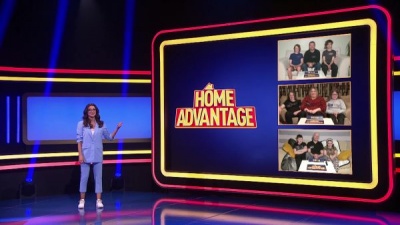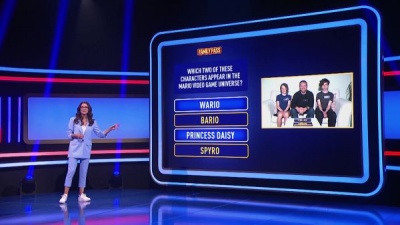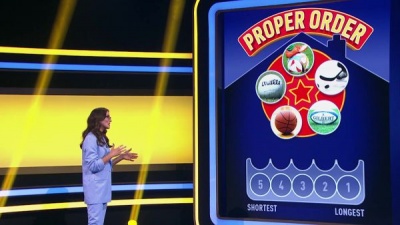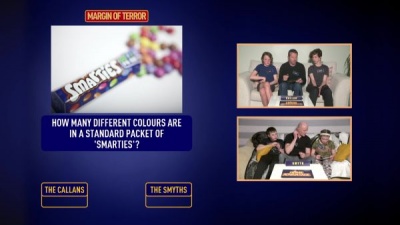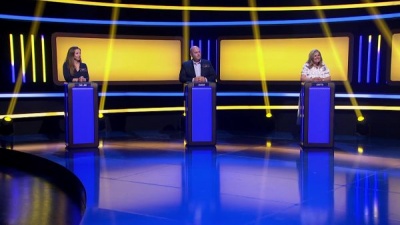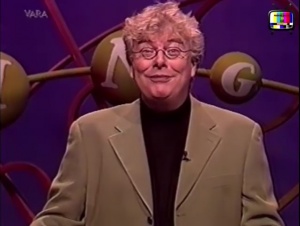Weaver's Week 2021-09-19
Last week | Weaver's Week Index | Next week
This week, we're looking at a couple of big new Saturday night shows from Ireland.
Contents |
The Big Deal
Bigger Stage Productions / Fox Alternative Entertainment for Virgin Media Television Ireland, shown on VM1 from 4 September
Do you ever watch a show and think, they're targetting someone totally different? This column gets it a lot. Sometimes, it's from programmes massively above our intellectual level, like Swashbuckle. Sometimes, it's from programmes in languages we don't speak, like Hewlfa Drysor. And sometimes, it's because we're watching as a member of the public, but the show's being made for television executives around the world.
The Big Deal opened its series by explaining the concept. People we don't know, saying how excited they are. Shots of a vacant studio as the music swells. Then – foom! – we're straight into a montage spectacular performances.
Cut into this sizzle reel are some talking heads. A man in a hat explains, "It's a talent show, it's a competition". A woman adds, "We're offering lump sums of cash, all the way through to the final". Another man says, "Control is in the contestants' hands", backed by another woman, "The act has got some power". A double-act tell us "You have to be brave". That hat man says, "Only one act can win. Take the money, or take the chance?" And then we're into the CGI opening sequence, figures dancing and singing around the show's logo.
That sizzle reel lasted two minutes and nine seconds. It's explained the show, cut in amongst some footage of acts on the stage, and they've used electroclash music to make it sound vibrant and important. After two minutes, our telly exec will know if this is a show they could potentially make for their own network.
Having explained the show, we're now going to explain the show again. Vogue Williams comes on stage, and promises "the best talent Ireland has to offer". At the end of the series, one winner will walk away with the top prize, €50 000.
But there's a twist. After each performance, the act will be offered a cash deal to walk away at once. If they take the money, they leave the show at once. Stay in the contest, and they'll be judged by the professional panel.
Who are these people? Boy George, the Culture Club singer who has an Irish mother. Lyra, the singer-songwriter. Aston Merrygold, singer and performer with JLS. Deirdre O'Kane, an experienced light entertainment person. And Jedward, singers and dancers and Eurovision experts.
All five of them are sat behind one long desk, at a suitable distance from each other. After we see the judges' profiles, Vogue has a brief chat with each of them. This helps to cement the ability of the judges, wave their credentials before us.
But it does drag on a bit. It's 6½ minutes before the first contestant steps on stage, and begins to show his pre-shot video. We see his girlfriend and family waiting backstage, like they do on The Voice. Kevin performs his song – "Defying gravity" from Wicked – an optimistic song but does it fit a baritone voice? Throughout the performance, there's applause from the audience – we will later see a small number of people behind the judges, but we suspect most of the applause comes from a can.
Once the performance has ended, we hear from each of the judges, offering their opinion on the song, the question they're pondering or their first impression. After they've all spoken, each judge votes in secret. The camera pans along the desk, and tense music plays.
Kevin is now offered the cash deal. He can take €1000 and leave at once, or remain in the competition and see the votes. Three votes are required for him to progress. He milks the moment for all that it's worth before deciding to take his chances in the competition.
A tower of silver squares appears, and Vogue asks, "Do we have a vote?" We do, Lyra has opted to keep Kevin in the contest. "Do we have another vote?" Jedward have said yes. "And do we have a third vote?" Indeed, Aston sends Kevin through. The others didn't back him, but that doesn't matter – three yesses is enough to send Kevin through. He's pleased.
After the commercial break, we see Jamie and Jordan, street dancers. They also opt to take a chance on the judges, but find that only one has backed them. The set's neon lights briefly lose their purple-to-pink-to-teal hue, and become full-on red. Sad music plays, and Vogue asks "How does that make you feel?"
And then we see Mia, a singer. She's not got a pre-performance video montage, a sure sign that she won't be with us for very long. Her performance of "Say a little prayer" is breathy, though with an indefinable tone. With a little more training, she'll be awesome, but she's not there yet. Mia is offered €1000 to leave the contest, just like every other contestant on the show this week. Unlike the others we've seen, she chooses to take the deal. It was the right call, only Jedward backed Mia's talent.
So, we've had 26 minutes of show, and we've seen all the possible outcomes – someone progressing, someone failing, someone taking the money. Our hypothetical television executive now knows the shape of the programme, and could be thinking about how they might structure it for their market, where they might put the commercial breaks, or if it's too similar to a show they already have.
After the commercial break, the show continues, with pieces to camera from the judges. We see brief footage of three acts – another singer, an aerial performer, and some Irish dancing. But rather than see these performances in full, it's the judges summarising the format with these examples. This really is laying it on thick for our telly executive, who has been reminded of what the show's about once more.
The remainder of the programme is more for the viewers at home. A magician performs a mentalist trick, while Connor and Victoria are singers. Both progress in the competition, the latter duo with all five votes. Some quality singers in the final spot on the series opener? They'll be favoured for the final.
Five full performances in the show, three others summarised in a few seconds, and we come away from the hour expecting to see just a little more. It's clear that the judges are giving clues to how they might vote, without actually disclosing how they will vote. "Take the deal, or take a chance?" the catchphrase, because someone else has bagged "Deal, or no deal?"
The second week continued along similar lines: young ballerina Angela got a "yes" from the whole panel, hip-hop Irish dancers Michael and Matthew also scored unanimous "yes" votes, while roller-skating act Shauna and Rafael made it with four votes after a bit of a stumble. Pole dancer Spready Mercury was quite right to take the €1000, and Martin McDonnall closed the show with unanimous "yes" votes. The montage was covered by the judging panel talking about each other, rather than about the performers. The show found the right pace, six full performances and three more in summary.
For the general public, they've made a perfectly watchable show – and almost 200,000 people saw the opening episode, a decent figure for VM1. Vogue Williams is the host, thoroughly competent and more than a little glamorous.
What can we conclude? As we see it, The Big Deal is a moderate-to-big show. Everything's done on a single stage in a single theatre (The Point Theatre in Dublin). The prizes are relatively modest – the series winner has a bit more than one year's average wage, the handful of people who quit earlier will be a line item in the budget. Even the backing screens are limited, they show a starburst, or concentric squares, or a repetitive geometric pattern.
Alex Shenkman has composed a buzzing electroclash soundtrack, which never threatens to burst into a memorable tune, but identifies the programme well. We assume that the outline set design – in particular, the tower – is part of the format, but perhaps the colour palette is not. We hope that the show's gentle positivity is part of the format: everyone has a chance to walk away with something, nobody is out to put anyone else down, it's all done as good fun.
And all this is of great importance to Fox Entertainment, whose format this is. The Big Deal is a pilot series, co-produced with Dublin's Bigger Stage company. It gives Fox some experience in actually making the format, shows what works and what doesn't. Ireland's a great testing ground, they speak a language close to American and are accustomed to light entertainment formats.
If we're brutally honest, we don't expect to see The Big Deal cross the channel to Britain. With its limited scale and ambition, we could put it on Channel 5, but Channel 5 have made it very clear they don't want shiny floor talent shows. It's too big for ITV2 and E4, too small for BBC1, and too similar to Got Talent for ITV.
But that limited scale and ambition is exactly what The Big Deal needs to sell into smaller markets, or to minority channels with other priorities. We can, for instance, imagine the second-tier German channel Pro7 snapping up the format, and doing the whole series over two Saturday nights. It'll bring in enough viewers and enough advertising revenue to make it worth the effort.
The Big Deal is a good show. Not great, but it's worth the effort.
Home Advantage
Loosehorse for RTÉ1, from 10 April
We noted last year how RTÉ's hit show Winning Streak had been stopped, what with one thing and another. Can't encourage people to travel irresponsibly, can't really hold a light-hearted lottery show in front of empty seats. Eventually, they came up with a new idea. Format devisers Peter Murphy and Cormac Hardagen came up with a way to have a family quiz in these unusual times.
Jennifer Zamparelli is the host, she's from RTÉ Radio 2's breakfast show, very much the Rickie Melvin and Charlie of the airwaves. She's intense, loud, and will dominate any space she's in. For this show, Jennifer's in a space with three contestants, each representing their family.
The rest of the players are sat on their own family sofa, safe and sound at home. The magic of video links and meeting technology brings quizzers together, and this show is no exception. Getting the internet to hold together can be a a a a a a a NO SIGNAL.
While we reboot our router, here's a picture of Jennifer Zamparelli holding a question card.
 Jennifer doesn't actually use any question cards in the show.
Jennifer doesn't actually use any question cards in the show.
As we were saying, the internet is liable to interruption. To keep the technology manageable, Home Advantage doesn't try to use anything complex, like buzzers. All questions throughout the show are assigned to a player, and nothing gets passed over.
Round one is "Family Pass". Each team's shown a question with four possible answers. Only two of the answers are correct, but which two. The family at home – a parent and two school-age children – discuss the topic before selecting their two answers. Their player in the studio can then accept the answer, or change just one of the answers for a better one. The studio decision is final, and there's one point for each correct answer.
Think carefully before changing the answer, studio player: if you get it wrong, then there will be some sharp looks when you get back to the sofa. Always assuming you're allowed to sit on the sofa, and not on the floor....
Twice round the teams, then we're into round two, "Proper Order". This one's got five events or things, and the task is to put them in order. Which of these events in Irish history took place first: visit from JFK or visit from Grace Kelly? And was that before or after Ronald Reagan dropped by? The home and studio players have a short conversation, before the studio player gives the final answer. Again, it's one point for each thing put in the right order.
RTÉ is a commercial channel, and after 20 minutes of quiz and chat, it's time to show some commercials. It's also time to lose the lowest-scoring team, sent home with nothing more than a Home Advantage beanbag.
Scores are reset for part two, "Margin of Terror". The teams are asked questions with a number answer. Write down your answer, closer answer wins. First question goes to players at home for a single point; second question to the studio players for two points. For the third question, the studio player decided whether to play themselves or send the question home. Three points for this last question.
There is nothing terrifying about this round, other than the fact that the first two questions are relevant only as a tiebreak. Losers leave the game here, again taking nothing more than a beanbag.
The family with more points goes on to play the final. The studio player faces five questions, each with two possible answers. There's a prize of €500 for each correct answer, doubled to €5000 if they sweep the board. But the studio player must send one question to their home players, and to prevent any sort of cheating the link to the studio is briefly disconnected.
And that's the show, complete in just over 30 minutes, and dragged out to reach even that modest length. The questions have a distinctly Irish tinge – is a GAA hurling match longer than a rugby match, what was Dustin the Turkey's surname? But the questions can't be too witty, Home Advantage has to appeal to the 11-year-old who wants an Xbox, their 40-something parent who wants a greenhouse, and doubtless their even older granny who wants to know when it's safe to see little Johnny with his Xbox fingers.
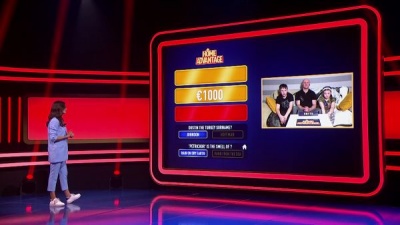 Answers are locked in for the final round; we rarely get a shot of family and studio player at once.
Answers are locked in for the final round; we rarely get a shot of family and studio player at once.
The show lacks pace, and doesn't have enough charm or wit to make up for the gap. Jennifer Zamparelli is a loud host, at times we wonder if they could turn the internet off and still hear her four counties away. More tellingly, she doesn't really lean into what the families are saying. Michael McIntyre's Home Advantage would be a riot, and Home Advantage in the style of The Button would be unpredictable. Zamparelli's show goes from A to B without much scenery. The canned crowd whoop and holler at every opportunity in the script, plus quite a few that aren't: while some crowd is necessary, we'd rather they kept it realistic.
Bizarrely, we can actually place Home Advantage on this side of the channel: it's a show for any channel wanting to burnish their "family" credentials: Sky and S4C are equally likely venues. They'll need to get round the culture's fear of identifying children on screen – or work with older relatives. But the show is cheap, the tech reliable and – as Last Commanders showed – can be made easy enough for an adult to set up.
In other news
The death of François Boulangé, host of Lingo for Dutch broadcaster VARA from 1992-2000. While he wasn't the first host of the show, he was the best-known, and earned the nickname "Mister Lingo". A producer turned presenter, Boulangé also devised some of the games on daytime show Triviant, and directed versions of Boggle and De Connaisseur. François Boulangé was 67.
Quizzy Mondays featured a banger of a University Challenge match, Imperial London beat St John's Cambridge by 200-155. Highlight was Max Zeng's knowledge of geography and shared borders. Only Connect had the Apollos beat the Wildlifers 24-19, with guest appearances by musical twins Tegan & Sara, by a manic pixie dream girl, and by some trifles.
The questions we left eariler: yes, Wario and Princess Peach are in the Mario universe. The sports order is basketball, ice-hockey, inter-county hurling, rugby, soccer. There are eight colours in Smarties, and Dustin the Turkey's surname is Hoffman.
Channel 4's new autumn season begins, with Bake Off (Tue) and Taskmaster (Thu). The Satellite Channel has revived Never Mind the Buzzcocks (Tue), and there's a new series of Un Cwestiwn (S4C, Tue). Jenny Ryan tries her hand at Stephen Mulhern's Celebrity Catchphrase with Stephen Mulhern (ITV, Sat).
Bigger Stage Productions / Fox Alternative Entertainment, Loosehorse / RTÉ, VARA / NPO
To have Weaver's Week emailed to you on publication day, receive our exclusive TV roundup of the game shows in the week ahead, and chat to other ukgameshows.com readers, sign up to our Google Group.


